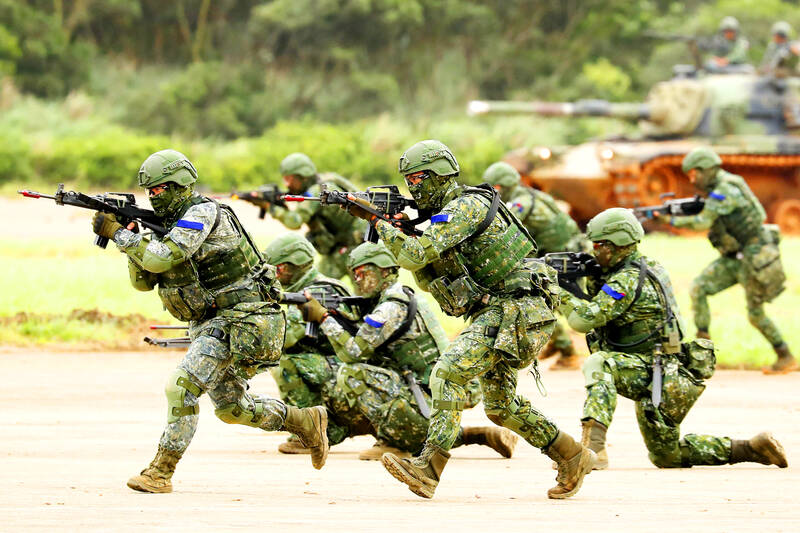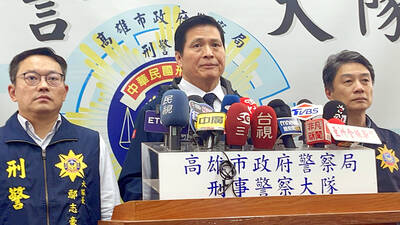The Ministry of National Defense should work to forecast developments in modern warfare before revising military training programs, a military expert said, as a plan to extend conscription is expected to be finalized by President Tsai Ing-wen (蔡英文) this week.
The ministry has been deliberating whether to extend conscription to one year from four months in response to increasing Chinese military threats, but it has so far not announced any details of the plan.
Institute for National Defense and Security Research postdoctoral researcher Hsu Chih-hsiang (許智翔) on Saturday said that Taiwan’s armed forces have recently updated their weaponry and equipment, adding that infantry training schedules have also been updated.

Photo: Ritchie B. Tongo, EPA-EFE
Rifle-firing exercises now also include shooting in kneeling and standing positions, in addition to shooting in prone position, he said.
New conscripts fire more bullets during training than previously conscripted service members, he added.
However, the number of bullets fired should be further increased, as “it takes a lot of practice to gain specialization,” he said.
The focus of conscript training is on infantry skills, resulting in a lack of other skills among reserve forces, he said, adding that specialization requires more extensive small-unit training.
Retired army general Richard Hu (胡瑞舟) said that “traditional training does not have to be in contradiction with modern training.”
Bayonet drills are often seen as outdated, but the US Army used bayonets in the wars in Afghanistan and Iraq to fight at close quarters, said Hu, who is deputy director of National Chengchi University’s Taiwan Center for Security Studies.
The time allotted for each exercise is most important, he said, adding that the focus should be on thorough training instead of assigning conscripts to do chores.
Hsu echoed the retired general in his assessment.
Urban warfare is a crucial part of defense strategies, Hsu said, adding that it is necessary to draw up training materials that focus on rifle-firing, hand-to-hand combat techniques and practical bayonet skills.
After conscripts are discharged, weapon training and small-unit tactical training should be the focus of regular exercises, he said.
“Agile small units are of utmost importance,” as such units might need to operate largely independently in wartime, when effective top-down communication might not always be possible, he said.
When there are multiple lines of operation on a battlefield, units have to be agile enough to carry out military actions, he said.
Aside from concrete exercises, “the core question is what is the armed forces’ vision of the future battlefield,” Hsu said, adding that training programs and equipment procurement should based on that vision.
The ministry should pay attention to developments in modern warfare, Hsu said.
For example, Taiwan can learn lessons from Ukraine’s efforts to defend itself amid the ongoing Russian invasion, he said.
Taiwan should adopt tactics that are successfully used by Ukrainian forces, Hsu added.
The ministry’s two most recent defense reports did not reflect trends in modern warfare and how to defend against an enemy deploying such tactics, he said.
Taiwan should improve its approach in a timely manner, as it would otherwise be in an extremely disadvantageous position if it is attacked, he added.

Twenty-four Republican members of the US House of Representatives yesterday introduced a concurrent resolution calling on the US government to abolish the “one China” policy and restore formal diplomatic relations with Taiwan. Led by US representatives Tom Tiffany and Scott Perry, the resolution calls for not only re-establishing formal relations, but also urges the US Trade Representative to negotiate a free-trade agreement (FTA) with Taiwan and for US officials to advocate for Taiwan’s full membership in the UN and other international organizations. In a news release announcing the resolution, Tiffany, who represents a Wisconsin district, called the “one China” policy “outdated, counterproductive

Actress Barbie Hsu (徐熙媛) has “returned home” to Taiwan, and there are no plans to hold a funeral for the TV star who died in Japan from influenza- induced pneumonia, her family said in a statement Wednesday night. The statement was released after local media outlets reported that Barbie Hsu’s ashes were brought back Taiwan on board a private jet, which arrived at Taipei Songshan Airport around 3 p.m. on Wednesday. To the reporters waiting at the airport, the statement issued by the family read “(we) appreciate friends working in the media for waiting in the cold weather.” “She has safely returned home.

ON PAROLE: The 73-year-old suspect has a criminal record of rape committed when he was serving in the military, as well as robbery and theft, police said The Kaohsiung District Court yesterday approved the detention of a 73-year-old man for allegedly murdering three women. The suspect, surnamed Chang (張), was arrested on Wednesday evening in connection with the death of a 71-year-old woman surnamed Chao (趙). The Kaohsiung City Police Department yesterday also unveiled the identities of two other possible victims in the serial killing case, a 75-year-old woman surnamed Huang (黃), the suspect’s sister-in-law, and a 75-year-old woman surnamed Chang (張), who is not related to the suspect. The case came to light when Chao disappeared after taking the suspect back to his residence on Sunday. Police, upon reviewing CCTV

TRUMP ERA: The change has sparked speculation on whether it was related to the new US president’s plan to dismiss more than 1,000 Joe Biden-era appointees The US government has declined to comment on a post that indicated the departure of Laura Rosenberger as chair of the American Institute in Taiwan (AIT). Neither the US Department of State nor the AIT has responded to the Central News Agency’s questions on the matter, after Rosenberger was listed as a former chair on the AIT’s official Web site, with her tenure marked as 2023 to this year. US officials have said previously that they usually do not comment on personnel changes within the government. Rosenberger was appointed head of the AIT in 2023, during the administration of former US president Joe